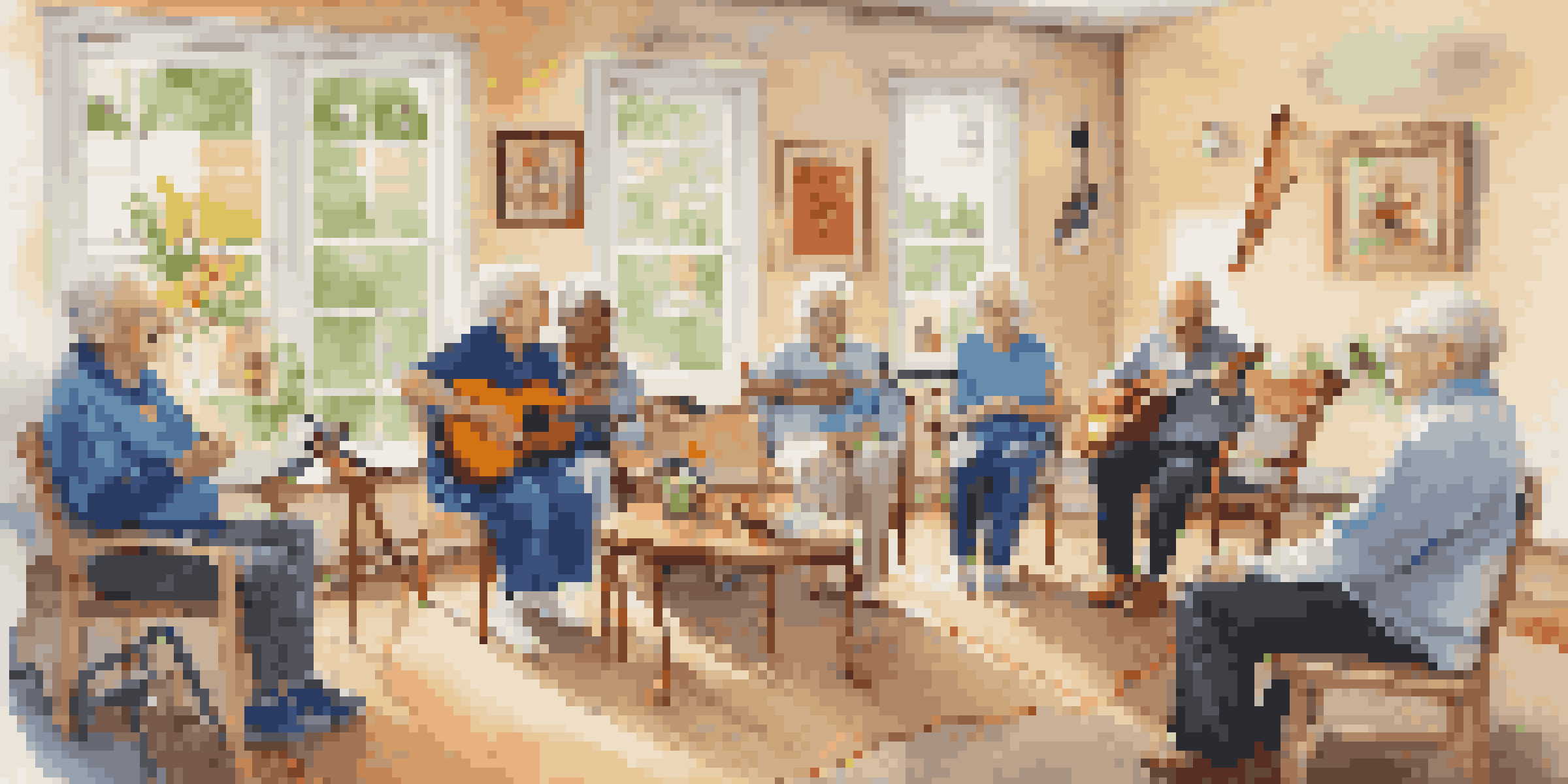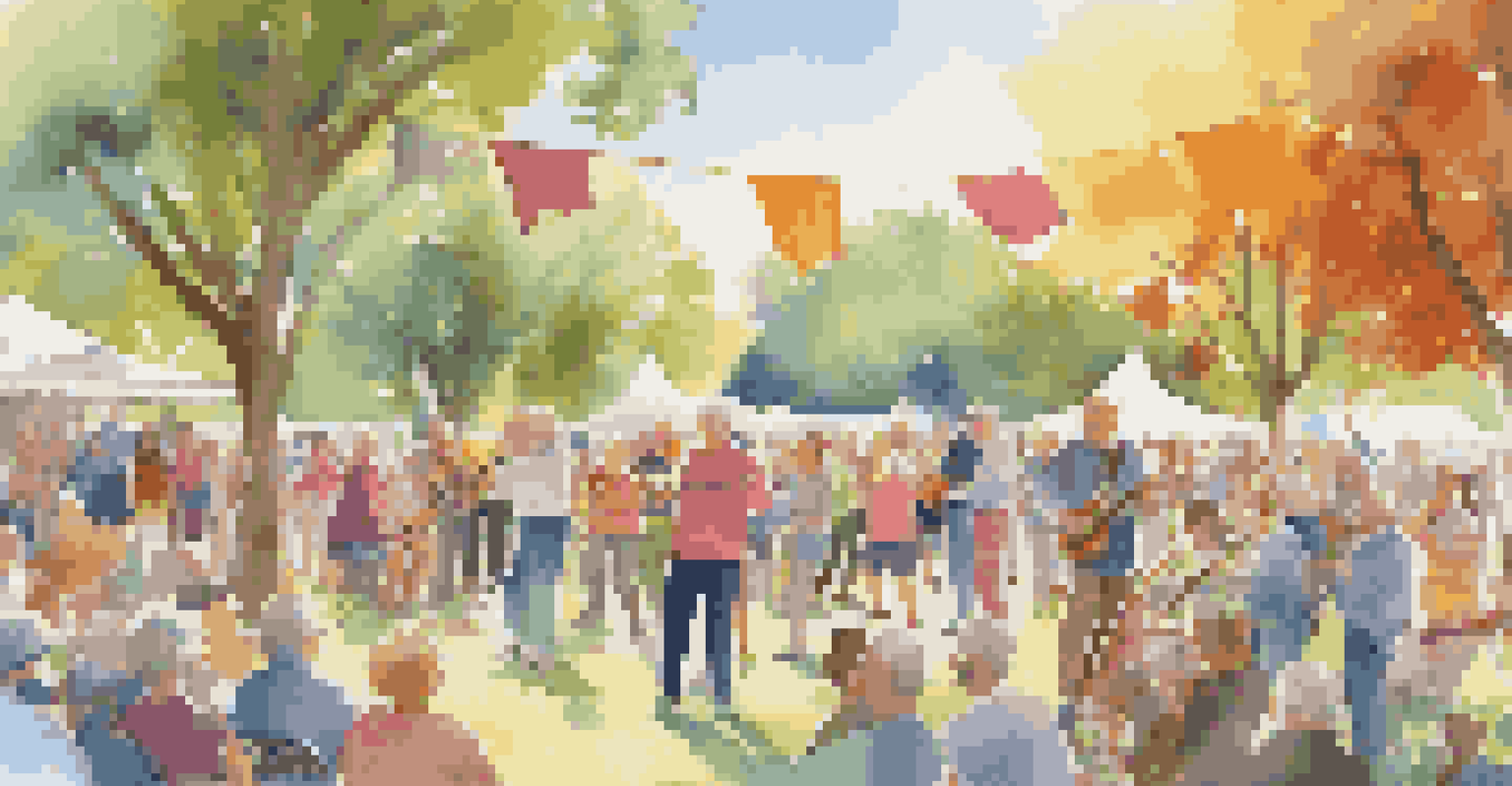The Influence of Music on Seniors' Sense of Identity

Understanding the Connection Between Music and Identity
Music is a powerful tool that can evoke deep emotions and memories, especially for seniors. It often serves as a soundtrack to their lives, marking significant moments and transitions. As we age, the music we resonate with can become intertwined with our sense of self, reflecting who we are and where we've been.
Music can change the world because it can change people.
For seniors, the genres and songs they loved in their youth can revitalize memories, helping them feel connected to their past. This connection can spark joy and provide a sense of continuity in their lives. The melodies and lyrics that once played during formative years often shape their identity and influence how they view the world.
Moreover, this relationship with music isn't just nostalgic; it can also help seniors articulate their feelings and experiences. When words fail, music can express emotions they might struggle to verbalize, allowing them to connect with their identities on a deeper level.
Music as a Tool for Memory Recall
One of the fascinating benefits of music is its ability to trigger memories. Research shows that familiar tunes can prompt recollections of specific events, people, or places, especially in seniors experiencing cognitive decline. This phenomenon is often referred to as the 'reminiscence bump,' where music from a person's youth evokes vivid memories.

For many seniors, listening to their favorite songs can transport them back to cherished moments, rekindling emotions and stories that may have faded over time. This can be incredibly therapeutic, as it not only boosts their mood but also reinforces their identity through shared experiences.
Music Shapes Identity for Seniors
Music serves as a powerful link to seniors' past, helping them connect with their identity and evoke cherished memories.
In group settings, such as assisted living facilities, music therapy can facilitate discussions and storytelling, helping seniors share their life stories with others. This social interaction fosters a sense of belonging and identity that is crucial for their emotional well-being.
The Role of Music in Emotional Health
Music has a unique ability to influence our emotions, and for seniors, it can be a vital part of emotional health. Listening to or participating in music can elevate mood, reduce anxiety, and alleviate feelings of loneliness. This emotional boost can significantly enhance their quality of life.
Where words fail, music speaks.
Participating in musical activities, such as singing or playing instruments, allows seniors to express themselves creatively, which is essential for maintaining a sense of identity. Engaging with music can provide a safe space to explore feelings and connect with others who share similar experiences.
Moreover, studies have shown that music can even lower feelings of depression in seniors, making it a powerful tool for mental health. When they connect with music, they often feel more vibrant and engaged, reinforcing their identities as active, valuable individuals.
Cultural Influences on Musical Preferences
A senior's musical preferences are often shaped by their cultural background and life experiences. Different cultures have distinct musical traditions that can influence how individuals connect with music throughout their lives. For seniors, this cultural connection can reinforce their identity and sense of belonging.
For instance, a senior who grew up in a particular cultural community may find that traditional songs evoke strong feelings of nostalgia and pride. These songs not only remind them of their heritage but also serve as a link to their family and cultural narratives.
Therapeutic Benefits of Music
Music therapy enhances cognitive and emotional well-being in seniors, providing a personalized approach to reconnecting with their identity.
As seniors share their cultural music with younger generations, they pass down important traditions and stories, further solidifying their identity. This exchange can be incredibly enriching, allowing seniors to feel valued and respected within their families and communities.
Music's Impact on Social Connections
Music can serve as a bridge for social connections, helping seniors engage with others. Whether it’s through attending concerts, singing in a choir, or participating in community music events, music creates opportunities for interaction. These social engagements are crucial for combating feelings of isolation and loneliness that many seniors face.
When seniors gather around music, they share experiences and emotions that strengthen their bonds. This communal aspect of music promotes friendships and a sense of belonging, which are essential for maintaining a strong sense of identity.
Additionally, these social connections can lead to new friendships and support systems, enhancing seniors' overall well-being. As they share their love for music, they also share parts of themselves, creating a rich tapestry of relationships built on common interests.
The Therapeutic Benefits of Music in Aging
Music therapy has emerged as a powerful tool in enhancing the lives of seniors. Trained therapists use music to address various cognitive, emotional, and social needs, providing tailored interventions that resonate with individual experiences. This personalized approach can help seniors reconnect with their sense of identity.
Through music therapy, seniors can engage in meaningful activities that promote cognitive function and emotional well-being. This could involve singing, songwriting, or even just listening to their favorite tunes, which can all have profound effects on mental health.
Cultural Roots Influence Musical Tastes
Seniors' musical preferences are often shaped by their cultural backgrounds, reinforcing their sense of belonging and identity.
As seniors participate in these therapeutic sessions, they often find a renewed sense of purpose and identity. The music they engage with can serve as a reminder of their strengths and resilience, fostering a positive self-image and emotional stability.
Creating Personalized Music Experiences for Seniors
To harness the benefits of music, it's essential to create personalized music experiences for seniors. This could involve compiling playlists of their favorite songs, organizing music-related activities, or even encouraging them to share their musical history with family and friends. These tailored experiences can significantly enhance their emotional well-being and sense of identity.
Incorporating music into daily routines can also be beneficial. Playing their favorite tunes during meals, or while engaging in activities, can serve as a delightful reminder of special moments in their lives. This simple act can uplift spirits and foster a sense of nostalgia that reinforces their identity.

Moreover, encouraging seniors to explore new genres or styles of music can be an exciting way to broaden their musical horizons. This exploration can lead to new connections and experiences, further enriching their lives and reinforcing their identity as lifelong learners.